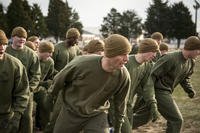Contrary to what one might expect, the most arduous part of a U.S. special operations selection program (or any demanding test, for that matter) is not the actual event itself. Don't get me wrong: Events like Navy SEAL Hell Week are still, well, hard as hell. But for many graduates, the most challenging periods were typically the 24 hours before the start and the first 24 hours after the demanding activity.
Understanding these specific time frames can help you mentally prepare for the challenges ahead and develop coping skills to handle both anxiety and high-stress recovery. Preparing yourself for a special operations forces selection event goes without saying, but if you are like many who train for years to accomplish your dreams, the anxiety to start and the exhaustion of completing your biggest hurdle will be very real.
The surge of stress hormones (primarily cortisol and adrenaline) before the event triggers a cascade of psychological responses. Restlessness, sweat, intrusive thoughts of doubt and a nervous stomach are just a few examples. These are the "butterflies," also known as the "pre-game jitters," that can significantly impact your mental state before events like Hell Week.
Once the event is over, the hormones that helped you endure pain and stay awake return to their normal levels, a phenomenon often referred to as the "adrenaline dump." Shortly after completing these grueling multiday events, the pain sets in. The body, no longer needing to expend energy for the required strength and stamina, begins to shut down and focus on recovery. The need for food and sleep becomes paramount.
How to Deal with Pre-Event Anxiety
Anxiety is anxiety, whether you're waiting for Hell Week to start or taking a final exam that determines the success or failure of a school year. Hormonally speaking, they are the same. But the amazing thing is that our mind and body are equipped to deal with these jitters -- all it takes is a little focused effort. The most common method is to get your mind focused back on the present and do things you can control. When we are anxious, we are focused on the future and, often, many things that are out of our control. Here are some skills to get back to the present:
1. Touch something coarse -- and breathe.
Place a piece of sandpaper or Velcro in your pocket. When you have anxious thoughts or butterflies, hold the item and focus on the feeling of touching something rough. It could also be soft and furry like a pet or silk, but the goal is to feel something in the here and now. Touching something, along with deep controlled inhales and exhales, is the quickest way for many to return to the present.
2. The 3-3-3 Rule for Anxiety
Therapist Gianna Volkes recommends the following actions to get grounded in the present:
- Name three things you see.
- Name three sounds you hear.
- Move three parts of your body.
Practice these coping skills daily, even if you are not stressed, and see whether you find them relaxing. The more you practice any of these skills, the better you will become and recognize when you need to deal with anxiety and stress.
3. Name It and Tame It
One of my favorite names for anxiety was used above: "pre-game jitters." These feelings are common before sporting events, fitness tests, presentations, interviews, meetings and major events. But any intrusive thought can be given a simple name, which gives the brain a place to file it instead of it constantly owning your thoughts. Have a stressor or disruptive thought? Name it so you say it, hear yourself say it and repeat it.
All these take practice. And, to be honest, remembering to do any of these in the middle of being stressed and anxious requires a level of internal awareness that must also be developed.
After the Anxiety Clears
After events that are excruciating and physically demanding, the main goal should be to get clean. If you have spent days in open water, dirt and sand, you must tend to any wounds and cuts and thoroughly clean yourself. It would take a few showers and even a bath and hot tub visit before I was completely clean. You will likely fall asleep quickly, but make sure you do these three things:
• Avoid infections: Clean yourself and take care of any open wounds.
• Eat and drink something healthy (protein, carbs, fats, electrolytes).
• Sleep: This is your No. 1 way to recover.
When you wake up, stand by to feel like everything in your body is swollen and hurting. Though you are elated that you finished, this is the worst part for most. When you awaken, move gently, as motion is lotion. Take another warm bath or sit in a hot tub and keep moving. With more movement, the pain will dissipate and you will feel better, but it may take the rest of the week to feel normal again. Keep eating and hydrating, taking naps, stretching and moving throughout the day. Be sure to double-check any open wounds for the healing process each day, as well.
Want to Learn More About Military Life?
Whether you're thinking of joining the military, looking for fitness and basic training tips, or keeping up with military life and benefits, Military.com has you covered. Subscribe to Military.com to have military news, updates and resources delivered directly to your inbox.


















